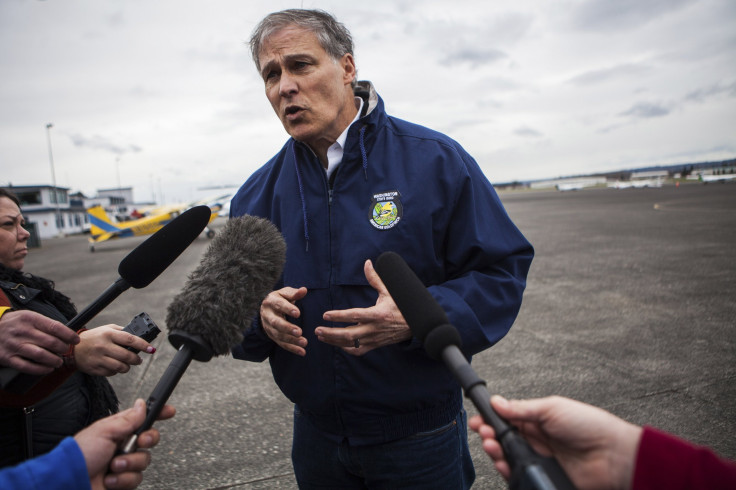Coronavirus US News: States Are Forming Regional Coalitions To Fill Vacuum Left By Feds
KEY POINTS
- The federal government's response to the virus has been woefully inadequate
- States are now forming regional coalitions, filling the vacuum left by the Feds
- This could have massive implications for how the U.S. governs itself moving forward
The United States' response to the coronavirus has been woefully inadequate, with the death toll from the virus going past 56,000 people, which is nearly 10,000 more lives than America lost in Vietnam -- and states are beginning to take what should have been the federal response into their own hands.
President Trump initially downplayed the virus, wasting crucial time that could have been used preparing for the pandemic. The Centers for Disease Control and Prevention’s tests failed, depriving the nation of a month to effectively track and combat the virus' spread. The Food and Drug Administration’s requirements stymied university labs from conducting tests.
Nearly everywhere you look, one can find an area where the response from the federal government is inadequate, and it is not just confined to President Trump’s actions (or inaction). As many have pointed out, the coronavirus has revealed what is already broken in America. In response to this widespread failure of the federal system, states are beginning to form regional coalitions -- often putting aside the politics that has become the hallmark of Washington's coronavirus response.
Berkeley artist and activist Alfred Twu put together a helpful map visualizing the litany of reports about states and localities creating their own support systems to combat the virus.
April 27: Nevada & Colorado formally join Western States Pact, county health officials on the Illinois-Missouri border work together since their governors won't, and Massachusetts now also coordinating with Vermont, Maine, and New Hampshire. 1/ pic.twitter.com/WrcosfLsS8
— Alfred Twu (@alfred_twu) April 27, 2020
Northeast states like New York, Pennsylvania, Connecticut, Rhode Island, New Jersey, Delaware and Massachusetts have formed the Regional Advisory Council to decide when those states should reopen. The governors of Illinois, Michigan, Ohio, Wisconsin, Minnesota, Kentucky and Indiana have created a similar task force in the Midwest.

The Western States Pact is comprised of Washington, California, Oregon, Nevada and Colorado, and according to Washington Gov. Jay Inslee, these states are combining their efforts and resources to create a “shared vision for modifying stay-at-home orders and fighting COVID-19.”
These new efforts are not confined to states either, as the mayors of Tennessee’s four largest cities created a task force to coordinate reopening the economy and creating efforts to halt the spread of the virus. In short a regional coalition is springing up nearly everywhere the federal government's response has fallen short.
These alliances transcend partisan politics, as many are comprised of both Republican and Democratic governors, demonstrating how at the state level, regional interests trump partisan politics. These alliances have major implications for how the U.S. will govern itself moving forward because if these regional coalitions are successful, it is unlikely that states will just abandon them after the crisis. It is quite possible that the U.S. is undergoing a dramatic reshaping of governance where regional coalitions replace certain functions of the federal government, effectively making the nation even more federalist than the Founding Fathers had envisioned.
These shifts could also have a dramatic impact on the 2020 election. Ohio was known as one of the most important swing states in every election until 2016 when Trump easily won it. And now conventional wisdom posits that it is a red state, despite many pollsters claiming that it is still up for grabs. Its Gov. Mike DeWine, a Republican, has already split with Trump on the coronavirus response -- he was one of the first governors to shut down his state’s economy. Ohio voters now rate DeWine over 30 percentage points more favorably than they grade Trump.
That same poll shows that Trump is only beating Joe Biden by one point in Ohio among voters who are “definitely” voting for either politician and if the federal government continues bungling its handling of the crisis. With DeWine receiving high marks for his work, it could further hurt Trump’s standing in that state.
The contrast in the responses of two Republican politicians could help reduce partisanship and focus the Ohio electorate’s attention on governance. Any electorate that is focused on the federal government’s response to the coronavirus is not good news for President Trump.
© Copyright IBTimes 2024. All rights reserved.





















